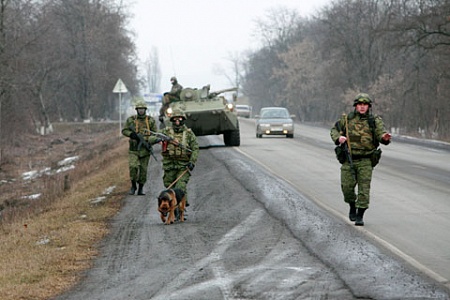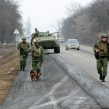
Three Rebels and a Republican Security Official Killed in Kabardino-Balkaria
Publication: Eurasia Daily Monitor Volume: 12 Issue: 134
By:

On July 14, Russian government forces in Kabardino-Balkaria managed to kill three members of the Islamic underground during a special operation in the republic’s Baksan district. During a counterterrorist operation two weeks earlier, government forces neutralized two insurgents in Nalchik, the republic’s capital. The Russian press is unable to distinguish between the different strands of the rebel movement and thus confuses its audience. One of the largest national newspapers hastily reported that all the slain militants belonged to the Caucasus Emirate (CE), but at the same time emphasized that they were members of the Islamic State (IS) (Ng.ru, July 15). Even the journalists who cover these topics regularly have not yet realized that the Caucasus Emirate has gradually transformed into a branch of the Islamic State in the North Caucasus, with the exception of a small group of rebels in Dagestan (see EDM, July 9).
Law enforcement officials in Kabardino-Balkaria reported they received information about a militant base in the area between the city of Baksan and the village of Dygulybgei. In reality, the Federal Security Service (FSB) prepares and carries out special operations while republican law enforcement personnel serve only as auxiliary forces in the area where the operation is being conducted. Officials said the head of the operational staff decided to impose and carry out a counterterrorist operation regime in the Baksan municipal district at 4:30 a.m. on July 14. It has become normal practice to schedule special operations in the early morning hours, apparently to take the suspects by surprise and reduce casualties among law enforcement personnel. Ministry of Interior and FSB agents encountered three militants who resisted using automatic weapons and hand grenades and were subsequently killed in a brief firefight. According to the FSB, the slain militants were members of the so-called Northeastern sector of the Kabardino-Balkarian jamaat and had reportedly been involved in multiple terrorist crimes, including a series of murders of law enforcement agents and members of the armed forces (Rg.ru, July 14).
Information from other sources indicates that government forces knew where they would find the militants and pretended they were combing the area simply to protect the informants who tipped them off about the rebels (Kavkazsky Uzel, July 14). Analysis of media reports also indicates that the rebels may have been lured out of a populated area in order to simplify the special operation for the government forces. Members of armed jamaats, with the exception of the Chechen jamaat, usually do not stay in summer camps in the forests or mountains, but live in urban environments, such as inside towns and villages.
The National Antiterrorist Committee of Russia (NAK) announced that the slain rebels were part of the so-called Northeastern sector of the local armed Islamist underground movement, whose members are active in Kabardino-Balkaria’s Baksan and Zol districts. According to the newspaper Kommerstant, police identified the dead militants as 41-year-old Boris Batyrov, 30-year-old Kasbulat Dyshekov and 23-year-old Rustam Beslaneev. All three were residents of Baksan district. One of them openly joined the insurgency about a year ago while the other two joined the rebels only recently (Kommersant, July 14).
It is peculiar that none of the three rebels was in the database of Kabardino-Balkaria’s interior ministry, and that the one who apparently was in the insurgency’s ranks for a year was not put on the police wanted list (07.mvd.ru/cit/Rozisk, accessed July 17). Government officials usually start claiming that rebels were somewhere in the police database only after they are killed. This allows the FSB and the interior ministry to manipulate the information: even when they kill an innocent person accidentally, they always claim the person was an active member of the Islamist armed underground movement, which in reality cannot be proven. On this occasion, the security forces said they found machine guns, a handgun and a large quantity of hand grenades and ammunition in the three-room dugout of the insurgents.
Meanwhile, as the special operation in Baksan district was coming to an end, unidentified assailants shot and killed a law enforcement official (Rosbalt.ru, July 14). According to preliminary information from Kabardino-Balkaria’s law enforcement agencies, two unidentified young people waited on the porch of a residential block of apartments in Nalchik’s Iskozh district. When the official, who was an internal security officer for the republican prosecutor general’s office, came out, one of the men shot him in the head with a handgun. Republican investigators are looking into several possible motives for the assassination, but the priority version is that the officer’s murder was connected to his professional activities. Whether this killing was in revenge for the death of the rebels in Baksan district is hard to say at this point, but this possibility cannot be dismissed.
The Kabardino-Balkarian jamaat thus far has not taken an official position vis-à-vis IS, but the commanders of other jamaats, who posted an audio pledge of allegiance to IS leader Abu Bakr al-Baghdadi on the Internet, on June 21, mentioned Kabardino-Balkaria, claiming all the militants of the velayats of Dagestan—Nokhchiycho (Ichkeria), Galgaiche (Ingushetia), and the joint velayat of Kabarda, Balkaria and Karachay (KBK)—had unanimously decided to join IS, and that there were no differences among themselves over this issue (Kavkazsky Uzel, June 23). The former amir of the Dagestani jamaat, Abu Muhammad Kadarsky (Rustam Asilderov), is the leader of the Velayat Kavkaz al Islamiya, which is the IS branch in the North Caucasus. Thus far, however, the tactics and strategy of the militant forces that were previously part of the CE have changed little.
The Islamic underground of the North Caucasus insurgency is experiencing its biggest crisis since 2007, and it is hard to say how long this may continue. The insurgency in the region is in the process of switching from the pan-Caucasian Caucasus Emirate, to the so-called Islamic State; and its long-term impact on the North Caucasus militant movement remain unclear.




